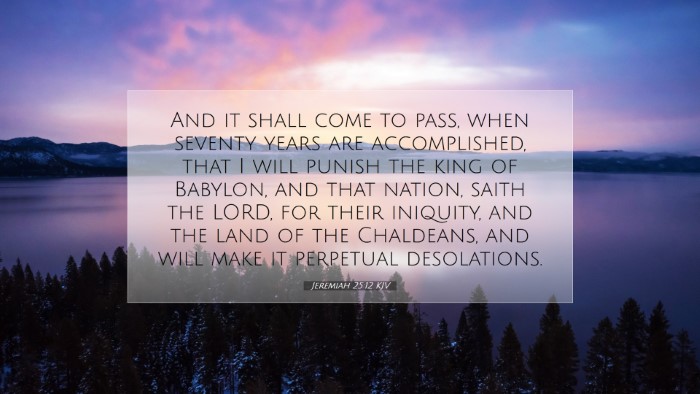Commentary on Jeremiah 25:12
Verse Context: Jeremiah 25:12 states, “And it shall come to pass, when seventy years are accomplished, that I will punish the king of Babylon, and that nation, saith the LORD, for their iniquity, and the land of the Chaldeans, and will make it perpetual desolations.” This strong prophetic proclamation by Jeremiah holds tremendous significance within the broader narrative of Israel's history and God’s plans for His people.
Historical Background
The prophet Jeremiah proclaimed these words during a tumultuous time for the people of Judah. The Babylonian exile, a significant event in biblical history, marked a turning point for Israel. Understanding the historical context of Jeremiah's message aids in grasping the fullness of God’s intentions and actions regarding His people and their oppressors.
Commentary Insights
-
Matthew Henry's Commentary:
Matthew Henry notes that the seventy years mentioned in this verse signifies a fixed period during which the Israelites would endure Babylonian captivity as part of God's judgment for their unfaithfulness. His exposition emphasizes the endurance of God's edict against Babylon once this timeframe had passed as a fulfillment of divine justice. Henry comments on the significance of this period as necessary for the correction and eventual restoration of God's people.
-
Albert Barnes' Notes:
Barnes elaborates on the theme of divine retribution, focusing on the idea that God will not only hold Israel accountable for their idolatry but will also bring judgment upon Babylon for its mistreatment and oppression of the Jewish people. He highlights the importance of the phrase "perpetual desolations" as indicative of God's ultimate power over nations and empires, suggesting that even the mightiest shall fall in accordance with divine will. Barnes emphasizes that this prophecy was a reminder of God’s sovereignty, contrasting human pride with divine authority.
-
Adam Clarke's Commentary:
Clarke interprets the passage within the scope of prophetic literature, suggesting that Jeremiah's message served as both a warning and a beacon of hope. He notes that the promise of punishment for Babylon reflects a broader theological principle—namely, that God sees and will respond to injustice. Clarke emphasizes the term "king of Babylon" as representative not only of Nebuchadnezzar's reign but of all oppressive regimes throughout history, highlighting a deeper redemptive arc in which God ultimately restores His people from captivity.
Theological Implications
This verse has profound theological implications, particularly regarding divine justice, mercy, and restoration. The prophecy underscores that God's people can take heart in His promises, knowing that while judgment may be severe, it is also purposeful and restorative. The seventy years of captivity serve as a backdrop for God's redemptive acts. It illustrates that divine planning often involves allowing suffering for a greater good, leading to purification and renewal.
God’s Sovereignty and Justice
The theme of God's sovereignty is evident in this verse. The control that God exerts over nations and kings, as seen in His orchestration of events leading to the downfall of Babylon, affirms that all earthly powers are ultimately subject to divine authority. God’s pattern of judgment against both His people and their oppressors acts as a reminder that the moral order established by God will ultimately prevail.
Redemption Through Judgment
The notion that judgment precedes redemption is a recurring theme in Scripture. In Jeremiah 25:12, judgment upon Babylon heralds the restoration of Israel and their return to the land. This theme encourages believers to understand that trials can be an avenue for growth and spiritual renewal; they are often part of God's plan to bring His people back to Him, as seen in the subsequent restoration after the exile.
Applications for Today
-
For Pastors:
This verse can be a profound reminder for church leaders about the importance of addressing sin within their congregations. It serves as a call to preach not only on God's mercy but also His judgement—calling the church back to a place of holiness as they engage with the surrounding culture.
-
For Students of Theology:
The interplay of divine justice and mercy in this verse invites robust theological discussion. Students should explore the historical contexts and prophetic literature to understand better how God's plans unfold through both judgment and redemption.
-
For Bible Scholars:
This passage serves as an important case study in understanding prophetic literature’s structure and message. Scholars can analyze how Jeremiah’s prophecies articulate larger themes of hope amidst despair and how they resonate through the entirety of biblical narrative.
Conclusion
Jeremiah 25:12 is a significant prophetic statement asserting God’s ultimate authority and justice. By examining insights from esteemed commentators like Matthew Henry, Albert Barnes, and Adam Clarke, we see the depth of meaning within this verse—signifying judgment, hope, and restoration. The themes encapsulated in this prophecy urge contemporary believers to reflect on God's role in the world and His unwavering commitment to both justice and redemption.


